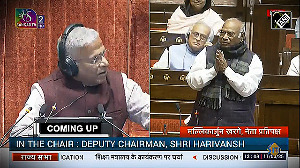Differences have arisen between broadcasters and cable operators and multi-system operators (MSOs), following the poor market response to the conditional access system (CAS) -- for which viewers must access free-to-air and pay channels through a set-top box.
A meeting to resolve these differences has been called on April 5 by the Telecom Regulatory Authority of India.
Broadcasters and cable operators want the government to allow a voluntary extension of CAS to other parts of Delhi, Mumbai, Kolkata and Chennai (CAS was made mandatory in designated areas of these cities from January this year). The MSOs -- which own the cable infrastructure and have cable operators as franchisees -- want CAS to be expanded by administrative fiat and made mandatory.
The meeting also takes place against the backdrop of mandatory enforcement of CAS in Bhubaneshwar, Ahmedabad, Hyderabad and Bhopal -- which has made the cable industry even more unhappy.
In the three months since CAS was implemented, industry estimates say only 30 per cent (or approximately 5 lakh) of the 1,700,000 CAS-enabled homes have opted for the system, with the remaining having opted for the free-to-air bouquet.
The poor performance of CAS has resulted in major losses for cable operators and broadcasters. Said Vikky Choudhary, a South Delhi cable operator who has seen revenues drop 35 to 40 per cent in the last three months, "Voluntary implementation of CAS is a better option as mandatory implementation has not worked, with viewers preferring to watch FTA channels."
Broadcasters like Star, Zee and Sony have suffered a dip in the ratings of their popular shows in CAS areas, resulting in advertisers asking for discounts on advertising spots. This is forcing them to support voluntary CAS expansion, though they were champions of mandatory imposition earlier.
Said Paritosh Joshi, president ad sales and distribution, Star India, "Going forward, it is best if customers can volunteer for CAS."
The MSOs, on the other hand, say broadcasters don't have compelling content for people to justify paying to watch these channels, which is why they have floated the idea of making CAS voluntary.
"We think that the response for CAS has been good and it should be made mandatory in other areas too," said Ashok Mansukhani, executive vice-president, corporate services, Hinduja Group, and president of MSO Alliance.
Mandatory CAS will shift control of the pay-TV market from the local cable operators, who tended to under-declare subscribers to pay lower revenues, to MSOs.
For MSOs, mandatory CAS offers transparency in determining subscription revenue. The policy will also help the MSOs use up their inventory of set-top boxes, which were imported in 2003 when the policy was originally announced.







 © 2025
© 2025